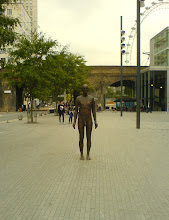So. Charles Moore, Noel Edmonds, and an ex-presenter of One Man and His Dog are uniting in a campaign of civil disobedience against the payment of the television licence fee. This, it has to be said, is a supremely moronic and reactionary campaign par excellence. The unfortunate Brand/Ross affair has undoubtedly provided moral ammunition for the deregulating ex-editor of The Daily Telegraph (who famously resigned to spend more time with Margaret Thatcher's family), but the BBC is not merely a provider of entertainment and information content, it is also one of the last unifying hubs of civil society in a increasingly fragmented culture and a fundamental guarantor of political liberty.
Eccentric personal grievances may make up a large part of their motivation, but are Moore et al seriously advocating that the likes of Rupert Murdoch and his corporation-owning ilk be left with completely free reign over the UK's mass media to push their own agenda? No other media organisation beside the BBC has the ethic of political impartiality and broadness of programming outlook so surely etched into its very constitution.
The argument that advertising-funded content is freely available elsewhere whether it is HDTV, radio, or internet based is a fleeting happenstance. Laying aside the sheer variety of public service broadcasting not covered by these other sources, we are living in the pioneer years of the net, digital radio and HDTV. With increasing concerns over bandwidth, the commercial structure of advertising funding and copyright issues, elite enclaves of closed systems and pay-per-view is looking like a frightening possibility.
Digital radio has only survived as a medium in the UK because of the presence of the BBC's ten national stations and its World Service. Channel 4, the only other public service broadcaster, recently ditched their plans for ten new digital radio stations and is struggling with a downward spiral in revenues. Already ITV is taking an axe to its regional news structure. Far from being outdated as an idea and superceded by these new providers, the BBC is actually now more necessary than ever to offer free, wide-ranging, non-partisan services. We cannot afford either politically or culturally to reduce, never mind lose, such a vital institution.
Saturday, 22 November 2008
Subscribe to:
Post Comments (Atom)



No comments:
Post a Comment